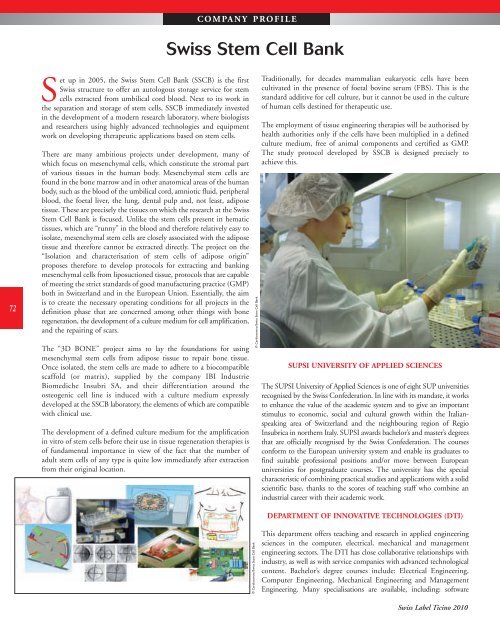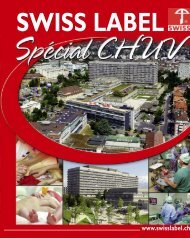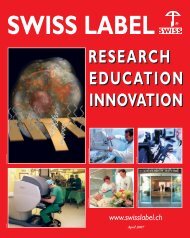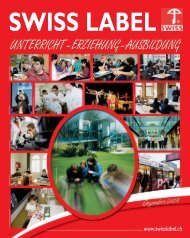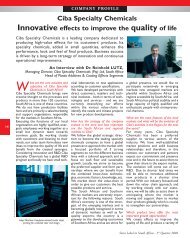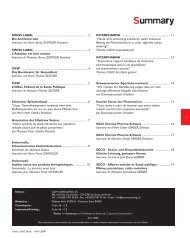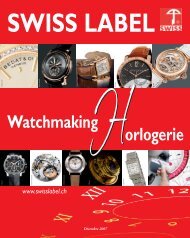swiss label - Com Consulting SA
swiss label - Com Consulting SA
swiss label - Com Consulting SA
Create successful ePaper yourself
Turn your PDF publications into a flip-book with our unique Google optimized e-Paper software.
72<br />
C O M PA N Y P RO F I L E<br />
Set up in 2005, the Swiss Stem Cell Bank (SSCB) is the first<br />
Swiss structure to offer an autologous storage service for stem<br />
cells extracted from umbilical cord blood. Next to its work in<br />
the separation and storage of stem cells, SSCB immediately invested<br />
in the development of a modern research laboratory, where biologists<br />
and researchers using highly advanced technologies and equipment<br />
work on developing therapeutic applications based on stem cells.<br />
There are many ambitious projects under development, many of<br />
which focus on mesenchymal cells, which constitute the stromal part<br />
of various tissues in the human body. Mesenchymal stem cells are<br />
found in the bone marrow and in other anatomical areas of the human<br />
body, such as the blood of the umbilical cord, amniotic fluid, peripheral<br />
blood, the foetal liver, the lung, dental pulp and, not least, adipose<br />
tissue. These are precisely the tissues on which the research at the Swiss<br />
Stem Cell Bank is focused. Unlike the stem cells present in hematic<br />
tissues, which are “runny” in the blood and therefore relatively easy to<br />
isolate, mesenchymal stem cells are closely associated with the adipose<br />
tissue and therefore cannot be extracted directly. The project on the<br />
“Isolation and characterisation of stem cells of adipose origin”<br />
proposes therefore to develop protocols for extracting and banking<br />
mesenchymal cells from liposuctioned tissue, protocols that are capable<br />
of meeting the strict standards of good manufacturing practice (GMP)<br />
both in Switzerland and in the European Union. Essentially, the aim<br />
is to create the necessary operating conditions for all projects in the<br />
definition phase that are concerned among other things with bone<br />
regeneration, the development of a culture medium for cell amplification,<br />
and the repairing of scars.<br />
The “3D BONE” project aims to lay the foundations for using<br />
mesenchymal stem cells from adipose tissue to repair bone tissue.<br />
Once isolated, the stem cells are made to adhere to a biocompatible<br />
scaffold (or matrix), supplied by the company IBI Industrie<br />
Biomediche Insubri <strong>SA</strong>, and their differentiation around the<br />
osteogenic cell line is induced with a culture medium expressly<br />
developed at the SSCB laboratory, the elements of which are compatible<br />
with clinical use.<br />
The development of a defined culture medium for the amplification<br />
in vitro of stem cells before their use in tissue regeneration therapies is<br />
of fundamental importance in view of the fact that the number of<br />
adult stem cells of any type is quite low immediately after extraction<br />
from their original location.<br />
Swiss Stem Cell Bank<br />
© Cardiocentro/Swiss Stem Cell Bank<br />
© Cardiocentro/Swiss Stem Cell Bank<br />
Traditionally, for decades mammalian eukaryotic cells have been<br />
cultivated in the presence of foetal bovine serum (FBS). This is the<br />
standard additive for cell culture, but it cannot be used in the culture<br />
of human cells destined for therapeutic use.<br />
The employment of tissue engineering therapies will be authorised by<br />
health authorities only if the cells have been multiplied in a defined<br />
culture medium, free of animal components and certified as GMP.<br />
The study protocol developed by SSCB is designed precisely to<br />
achieve this.<br />
SUPSI UNIVERSITY OF APPLIED SCIENCES<br />
The SUPSI University of Applied Sciences is one of eight SUP universities<br />
recognised by the Swiss Confederation. In line with its mandate, it works<br />
to enhance the value of the academic system and to give an important<br />
stimulus to economic, social and cultural growth within the Italianspeaking<br />
area of Switzerland and the neighbouring region of Regio<br />
Insubrica in northern Italy. SUPSI awards bachelor’s and master’s degrees<br />
that are officially recognised by the Swiss Confederation. The courses<br />
conform to the European university system and enable its graduates to<br />
find suitable professional positions and/or move between European<br />
universities for postgraduate courses. The university has the special<br />
characteristic of combining practical studies and applications with a solid<br />
scientific base, thanks to the scores of teaching staff who combine an<br />
industrial career with their academic work.<br />
DEPARTMENT OF INNOVATIVE TECHNOLOGIES (DTI)<br />
This department offers teaching and research in applied engineering<br />
sciences in the computer, electrical, mechanical and management<br />
engineering sectors. The DTI has close collaborative relationships with<br />
industry, as well as with service companies with advanced technological<br />
content. Bachelor’s degree courses include: Electrical Engineering,<br />
<strong>Com</strong>puter Engineering, Mechanical Engineering and Management<br />
Engineering. Many specialisations are available, including: software<br />
Swiss Label Ticino 2010


